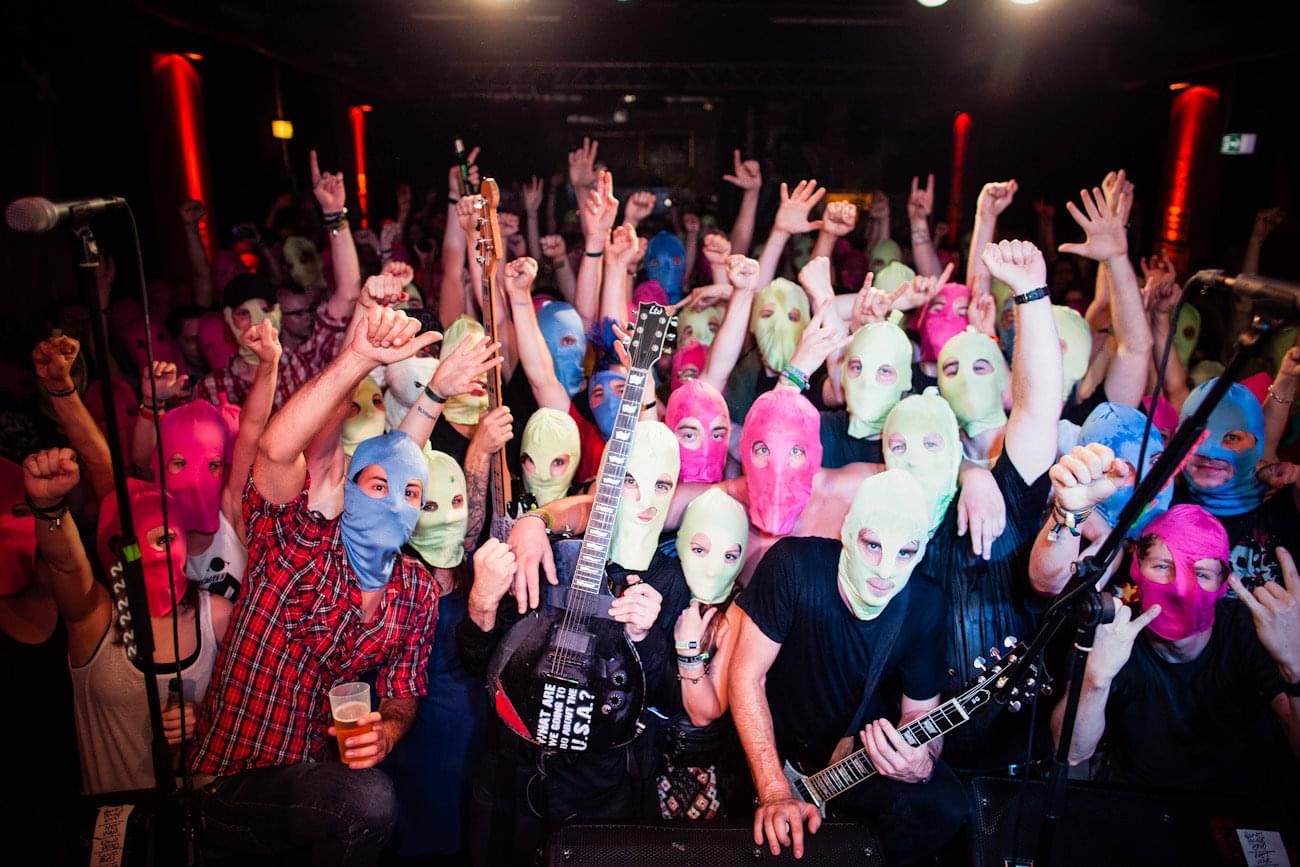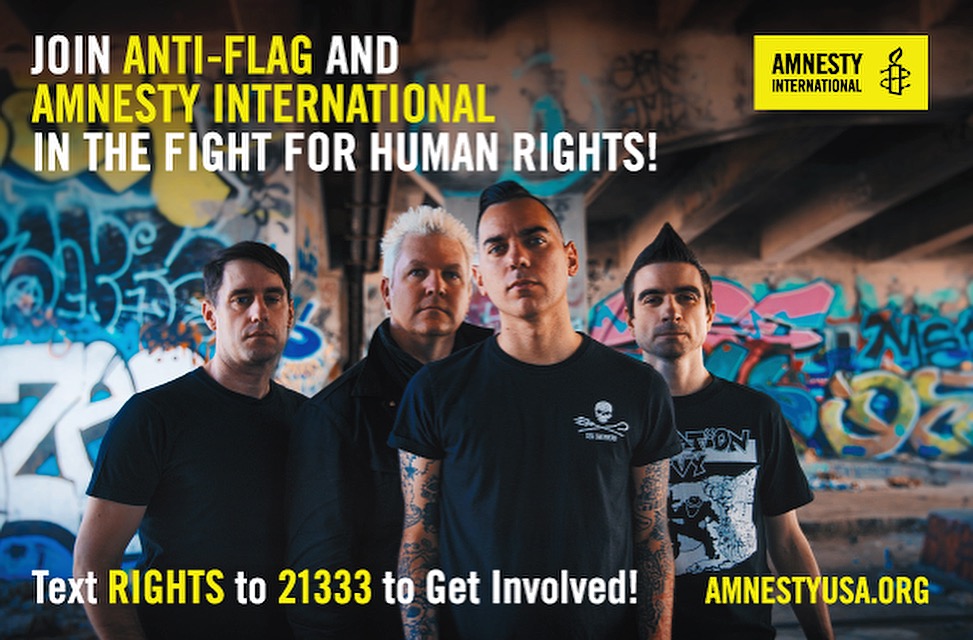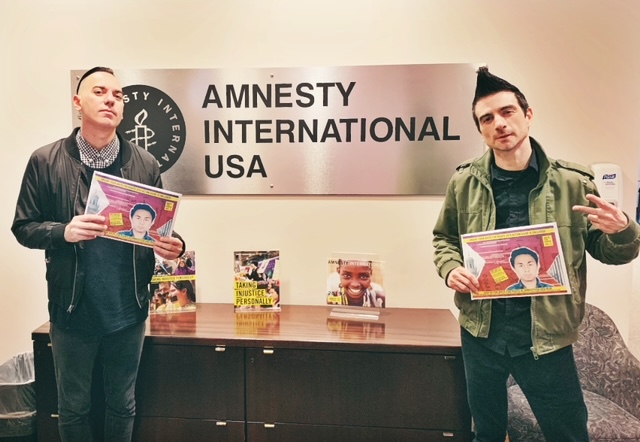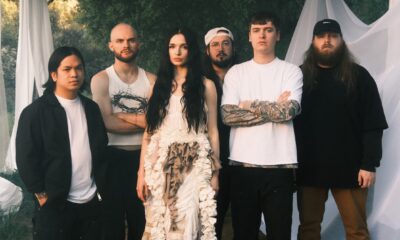Hardcore/Punk
Vox Populi: Anti-Flag Bassist Chris No. 2 Sounds Off on Systemic Inequality and Effecting Change
Supporting their upcoming 13th studio album ‘Lies They Tell Our Children,’ Anti-Flag bassist Chris No. 2 joins us for our inaugural edition of Vox Populi, wherein he discusses income and wealth disparity.
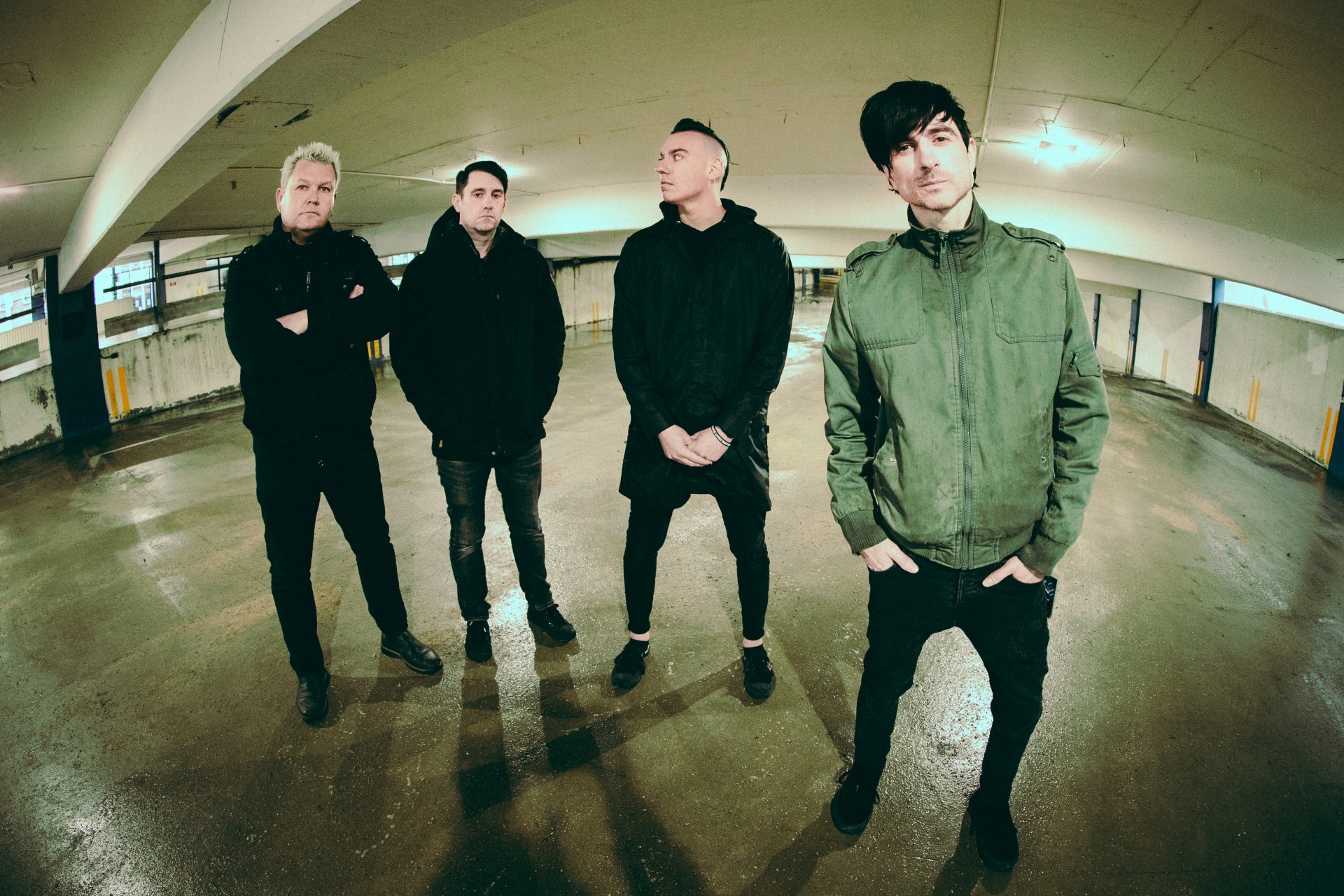
It’s not like punk rock legends Anti-Flag need any introduction; their history/legacy speaks for itself. We can tell you, however, a bit about the band’s brand new studio album, Lies They Tell Our Children, set for release on January 6th via Spinefarm Records. With this their 13th studio record, the group set out to write and record their first-ever concept album in their 30-year history. They were motivated to write a record like this based on a feeling of obligation to offer their thoughts on the bitter state of the world today, thanks to irresponsible and inconsiderate political decision-making, coarse and careless action by the world’s largest corporations that only widens the gap between rich and poor, and the general level of global injustice that seems only to get more severe.
What’s also significant about Lies They Tell Our Children is that it features a lot of impressive guest appearances from some of today’s best rock and punk rock artists. The album will include contributions from Shane Told of Silverstein, Jesse Leach of Killswitch Engage, Tim McIlrath of Rise Against, Brian Baker of Bad Religion, Ashrita Kumar of Pinkshift, and many more. The band has worked hard to broaden their horizons with this new release and provide their fanbase with an Anti-Flag record that can stand next to any of their most celebrated efforts.
For our first edition of Vox Populi, there was no better guest than Anti-Flag’s bassist Chris Barker, aka Chris No. 2, as we discussed income and wealth disparity, his early interest in social issues, what direction he sees the world moving in, and how we can tackle this systemic inequality.
No matter what your political or ethical outlook, there are issues and topics that we are all passionate about. Some examples are climate change, human rights, poverty, military conflicts, prejudice, and economic disparity. With this in mind, what’s the issue or topic that you are most passionate about?
Chris No. 2: “See, this is a difficult place to start. The intersectionality of all of these issues is real. A hyper-capitalist society demands profitability all the time; from everything and everyone. And to create that wealth, you must create poverty, and that poverty creates crime, punishment, a carceral state.
“Systemic economic and social inequity and inequality, racism, healthcare apartheid, all of it born out of the quest to make every solution to every crisis a point of profit and privilege. War for economic gain, a climate catastrophe, global health crisis, all of which the only solutions offered are ones that will make a few people very rich. That being said, eradicating corporate interest and money from global politics is the only real solution. No one who is consistently viewing the people and the planet as a commodity is going to save us from the crisis of capitalism.”
Why is this issue so important to you?
“We were politicized at very young ages here in Pittsburgh. To see the livelihoods of our families, loved ones, and communities gutted in lieu of cheaper labour and higher profit margins, it economically ravaged the communities of Pittsburgh and shaped how many of us would see the world moving forward. The poverty here led to mass increase in our family members who either ended up in jail, the military, or dead. It’s the reason our band is called Anti-Flag and why we consider ourselves to forever be an anti-war band.”
When did you first get involved in this issue?
“Unbeknownst to us, we were living with it essentially from day one of our lives. We’re all victims of it, carrying trauma from it, working, and living within the constraints of it. But ultimately, it began when we started seeing in high school that the only options being presented to us were to fail or be ask to possibly go fight, kill, and die with other poor people from around the world. So we chose punk rock. One of the only places providing space and solace that was antithetical to the status quo.”
What do you see as the biggest contributing factors to the issue?
“Well, as mentioned in my first response, it’s a system built to perpetuate the problems and provide its own power structure as the only solution to those problems. Historically, the opposite is true; those closest to the suffering are often those closest to the solution.”
Who are the key players involved in this issue today?
“Every president, prime minister, master of war, CEO, weapons manufacturer, lobbyist, banking system, for-profit healthcare system, for-profit education system, oil and gas barons, etc. The key players will often change as people jockey for the highest position of power they can reach, and then the job becomes maintaining and sustaining that power, at any cost.”
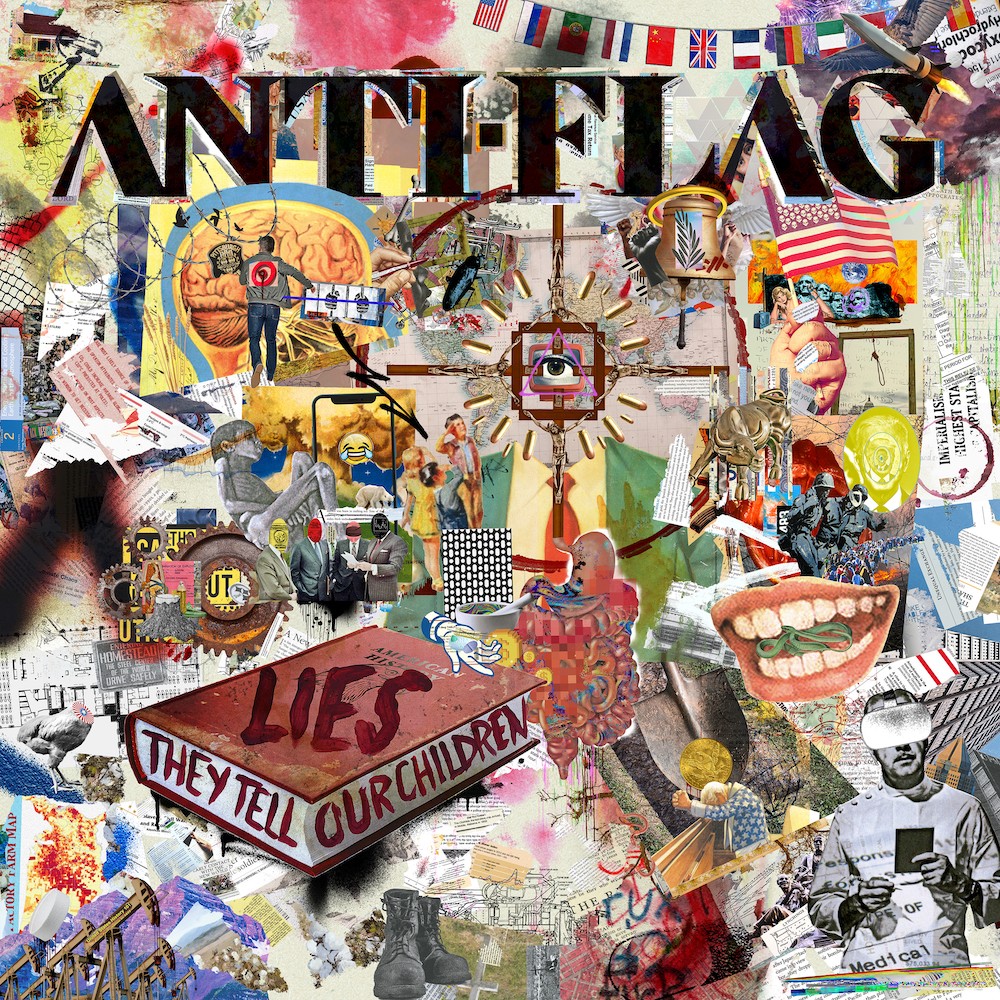
Artwork for the album ‘Lies They Tell Our Children’ by Anti-Flag
If you could have everyone in the world hear you for one minute, what would you tell them about this topic?
“It’s 2022; we are way past due for a change of values, investment, culture, and lifestyle. We know what the world looks like when we let the most wealthy of our societies control our bodies of government and economic systems. It looks like sewn division; economic, environmental, racial, sexual, and gender injustice. I am far more interested in conversations and actions to change our trajectory.
“The moral arc of history truly does bend towards justice, but too many of the most marginalized, scapegoated, and persecuted people do not have the time or luxury to wait. It demands action from all of us. It looks the same if we stay on the sidelines of it; let’s see what it looks like when we collectively choose empathy over apathy.”
What are some ways you’ve contributed to the solutions to these issues?
“You live it. Where you spend your money, the people you choose to interact and work with. The activism side of disobeying war and capitalism is not a competition. There are tremendous organizations that, in every aspect of our lives, can help us be better at resisting the demands of these power structures.
“From things as far-reaching as political prisoner writing campaigns via Amnesty International to acts of agitation and distribution like Pride Tape/Hockey Is Diversity/Players Against Hate who do local-level work to make the sport of hockey more kind and egalitarian. You can interject these ideals in everything you do, touch, and interact with.
What would be the simplest solution to this system of inequity and inequality? Would you want to take this approach?
“Be kind. In 2022 being kind and empathetic is an act of resistance. We’re being asked on a daily basis to ignore our humanity and treat our neighbours, immigrants, refugees, the poor, and the sick as our enemies. That’s so fucked up. You want to be a revolutionary today? Treat people with the respect and dignity they deserve and ask nothing in return.”
Where is the most influence wielded around this topic? How would you wield it if you had all of that influence?
“The epicenter is political power structures that allow multinational corporate influence to make them frankly work in the interest of campaign finance, their own individual wealth, and stock market manipulation instead of in the interests of votes or their voting constituents. To eradicate this we should make it illegal for this money to be involved in our collective politics.”
What musician or artist do you feel has been the most vocal about this topic?
“I’m sorry, I don’t know. There’s probably people who have dedicated their lives and their art to disrupting these systems in ways we haven’t seen or will never know. But we’re grateful for their commitment and work.”
- AFD Amnesty Collab in 2017
- AFD Anti-Flag at Amnesty International
Who has been the biggest inspiration in trying to deal with these societal disparities?
“It ebbs and flows, it can be artists, or it can be striking workers. Union organizers and activists. Journalists, musicians, painters. All working to speak truth to power and leave things better than they found them.”
What are some actions that readers can take right now to contribute to tackling this issue?
“I hate to repeat myself, but truthfully, if we can refocus ourselves and our energy into pushing empathy to the forefront of our decision-making and our interactions, that is how and where we win.”
If you could change one person’s mind completely and irrevocably, in order to help solve the issue, who would it be? Why?
“Perhaps Gates, Bezos, Raytheon, Boeing, Lockheed Martin, or any of the other richest men in the world. Divest from the structures that consolidated your wealth and invest in societal structures that level the playing field, eradicate war and poverty, and create health and education structures we can trust.”
Which organizations or agencies have been the most instrumental or helpful in attempting to tackle inequity and inequality?
“The people. Globally people are fighting back. Refusing to fight in wars, organizing, creating unions, recognizing our commonality is what makes us strong. And you have far more in common with the people you’re being asked to fight in a war than you do with the insanely wealthy person asking you to fight in their war.”
What is a book, movie, or another source of information you would recommend for anyone looking to get involved in this issue?
“The Shock Doctrine by Naomi Klein. Love, Anarchy and Emma Goldman by Candace Falk. The God of Small Things by Arundhati Roy.”
Do you think more or less government intervention is required to effect change? Which countries’ governments would have the most tangible impact if so? If not, what benefit will reduced government intervention have?
“Obviously, to eradicate war and war-based economics it would have to the world economic superpowers who change and overhaul their priorities. But ultimately, in a global world that is more connected and tuned into each other than ever, it isn’t up to a government, politician, president, prime minister, CIA kingpins, or anyone. It’s up to the people.”
- End Youth Homelessness benefit in Scranton PA
- Hockey Is Diversity charity game in Germany 2022
Which sources of news or information do you use to keep regularly updated on this topic?
“Democracynow.org, Code Pink, War Resisters League.”
Which sources of news or information do you distrust when it comes to this topic? Why?
“For-profit media. We have to always be cautious when interacting with advertising revenue-based news organizations. They’re working for ad investments, not working in the complete interest of the people receiving that information.”
If left unchecked, where do you see this issue heading in the years to come?
“The death of the planet.”
Let’s do a thought experiment: If this issue and others like it can be resolved, what world do you envision? How does it work? What does it look like? How does it sustain itself? Why does it work?
“It looks like people being free to follow their passions and loves, finding self-worth not based in economic status. There’s scientists, artists, sports stars, educators, the best and the brightest the world has to offer and they’re currently stolen from us from these systems of oppression. In every inch of war-torn land, there is wasted opportunity.”
-

 Music1 week ago
Music1 week agoTake That (w/ Olly Murs) Kick Off Four-Night Leeds Stint with Hit-Laden Spectacular [Photos]
-

 Alternative/Rock2 days ago
Alternative/Rock2 days agoThe V13 Fix #011 w/ Microwave, Full Of Hell, Cold Years and more
-

 Alternative/Rock1 week ago
Alternative/Rock1 week agoThe V13 Fix #010 w/ High on Fire, NOFX, My Dying Bride and more
-

 Features1 week ago
Features1 week agoTour Diary: Gen & The Degenerates Party Their Way Across America
-

 Culture2 weeks ago
Culture2 weeks agoDan Carter & George Miller Chat Foodinati Live, Heavy Metal Charities and Pre-Gig Meals
-

 Music1 week ago
Music1 week agoReclusive Producer Stumbleine Premieres Beat-Driven New Single “Cinderhaze”
-

 Indie2 days ago
Indie2 days agoDeadset Premiere Music Video for Addiction-Inspired “Heavy Eyes” Single
-

 Alternative/Rock2 weeks ago
Alternative/Rock2 weeks agoThree Lefts and a Right Premiere Their Guitar-Driven Single “Lovulator”

